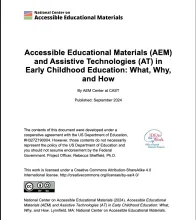
Accessible Educational Materials (AEM) and Assistive Technologies (AT) in Early Childhood Education: What, Why, and How
Read Accessible Educational Materials (AEM) and Assistive Technologies (AT) in …
In early childhood education, ensuring that all students, including those with disabilities, can access and engage with learning materials is a pivotal aspect of educational equity and inclusion. Accessible Educational Materials (AEM) and Assistive Technologies (AT) are central to this endeavor, providing essential resources that accommodate diverse learning needs (CAST, 2023). This paper explores the use of AEM and AT supports in inclusive early childhood settings by explaining what they are, why they are crucial for fostering inclusive learning environments, and how they can be implemented effectively.
National Center on Accessible Educational Materials (2024). Accessible Educational Materials (AEM) and Assistive Technologies (AT) in Early Childhood Education: What, Why, and How. Lynnfield, MA: National Center on Accessible Educational Materials. Retrieved [insert date] from https://aem.cast.org/get-started/resources/2024/accessible-educational-materials-aem-and-assistive-technologies-at-in-early-childhood-education-what-why-and-how
tags: Early Childhood, AEM
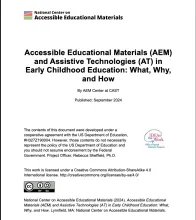
Podcast - Accessible Educational Materials (AEM) and Assistive Technologies (AT) in Early Childhood Education: What, Why, and How
Podcast for Accessible Educational Materials (AEM) and Assistive Technologies (…
In early childhood education, ensuring that all students, including those with disabilities, can access and engage with learning materials is a pivotal aspect of educational equity and inclusion. Accessible Educational Materials (AEM) and Assistive Technologies (AT) are central to this endeavor, providing essential resources that accommodate diverse learning needs (CAST, 2023). This paper explores the use of AEM and AT supports in inclusive early childhood settings by explaining what they are, why they are crucial for fostering inclusive learning environments, and how they can be implemented effectively.
National Center on Accessible Educational Materials (2024). Accessible Educational Materials (AEM) and Assistive Technologies (AT) in Early Childhood Education: What, Why, and How. Lynnfield, MA: National Center on Accessible Educational Materials. Retrieved [insert date] from https://aem.cast.org/get-started/resources/2024/accessible-educational-materials-aem-and-assistive-technologies-at-in-early-childhood-education-what-why-and-how
tags: Early Childhood, AEM

Early Intervention and Assistive Technology TA Document
EI and AT_July2024.pdf172.29 KB
The document provides a comprehensive overview of Assistive Technology (AT) for infants and toddlers with disabilities, outlining legal definitions, examples of AT devices, and services. It explains the differences between low, mid, and high-tech AT, and details the processes involved in selecting, implementing, and maintaining these tools. Additionally, it addresses the transition of children from early intervention to school-aged services, ensuring continued support through Individualized Family Service Plans (IFSP) and Individualized Education Programs (IEP).
tags: Early Childhood
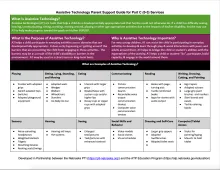
Assistive Technology Parent Support Guide for Part C (0-3) Services
Parent Guide Part B to Part C Services_July 2024.pdf157.51 KB
This guide was developed in partnership between the Nebraska PTI and the ATP Education Program. It is designed to help parents/families understand assistive technology, the purpose of assistive technology, and the importance of assistive technology within the context of Part C (0-3) services. Examples of potential assistive technology across multiple domains are provided. Key questions for parents/families are suggested for three stages that may be encountered during Part C services: (1) thinking about assistive technology needs; (2) thinking about assistive technology once the child has devices/systems written into his/her IFSP; and (3) transitioning from Part C to Part B services.
tags: Early Childhood
Setting Up Guided Access on iPad (iOS 17)
Setting Up Guided Access on iPad (iOS 17)
From our colleagues at Call Scottland, this poster summarizes how to use Guided Access on an iPad (iOS17).
tags: iOS Accessibility
A Guide to Single and Multi-Message Devices
A Guide to Single and Multi-Message Devices
From our colleagues at Call Scottland, a resource that describes how simple battery-operated communication devices can be highly effective tools for creating communication and learning opportunities across the curriculum. This infographic highlights the key features of some simple single and multi-message devices. There is information on price, size, recording time, power source and features.
tags: AAC
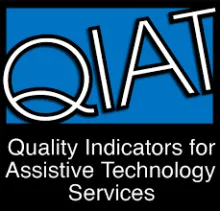
QIAT Indicators - Quality Indicators for Administrative Support of Assistive Technology Services
QIAT Indicators - Quality Indicators for Administrative Support of Assistive Te…
This area defines the critical areas of administrative support and leadership for developing and delivering assistive technology services. It involves the development of policies, procedures, and other supports necessary to improve quality of services and sustain effective assistive technology programs.
tags: QIAT, Administrative Support
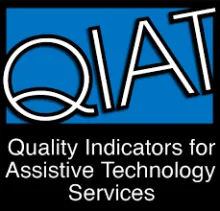
QIAT Indicators - Quality Indicators for Assistive Technology and Transition
QIAT Indicators - Quality Indicators for Assistive Technology and Transition
Transition plans for students who use assistive technology address the ways the student’s use of assistive technology devices and services are transferred from one setting to another. Assistive technology transition involves people from different classrooms, programs, buildings, or agencies working together to ensure continuity. Self-advocacy, advocacy and implementation are critical issues for transition planning.
tags: QIAT, Transition
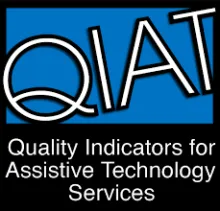
QIAT Indicators - Quality Indicators for Evaluation of the Effectiveness of Assistive Technology
QIAT Indicators - Quality Indicators for Evaluation of the Effectiveness of Ass…
This area addresses the evaluation of the effectiveness of the AT devices and services that are provided to individual students. It includes data collection, documentation and analysis to monitor changes in student performance resulting from the implementation of assistive technology services. Student performance is reviewed in order to identify if, when, or where modifications and revisions to the implementation are needed.
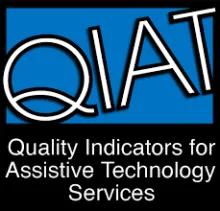
QIAT Indicators - Quality Indicators for Assistive Technology Implementation
QIAT Indicators - Quality Indicators for Assistive Technology Implementation
Assistive technology implementation pertains to the ways that assistive technology devices and services, as included in the IEP (including goals/objectives, related services, supplementary aids and services and accommodations or modifications) are delivered and integrated into the student’s educational program. Assistive technology implementation involves people working together to support the student using assistive technology to accomplish expected tasks necessary for active participation and progress in customary educational environments.
tags: QIAT, AT Implementation

 Powered by
Powered by